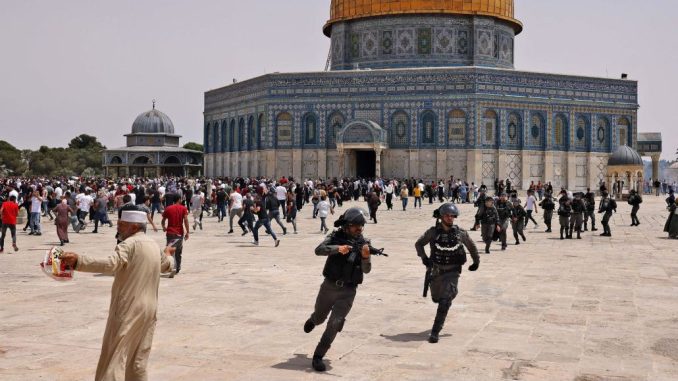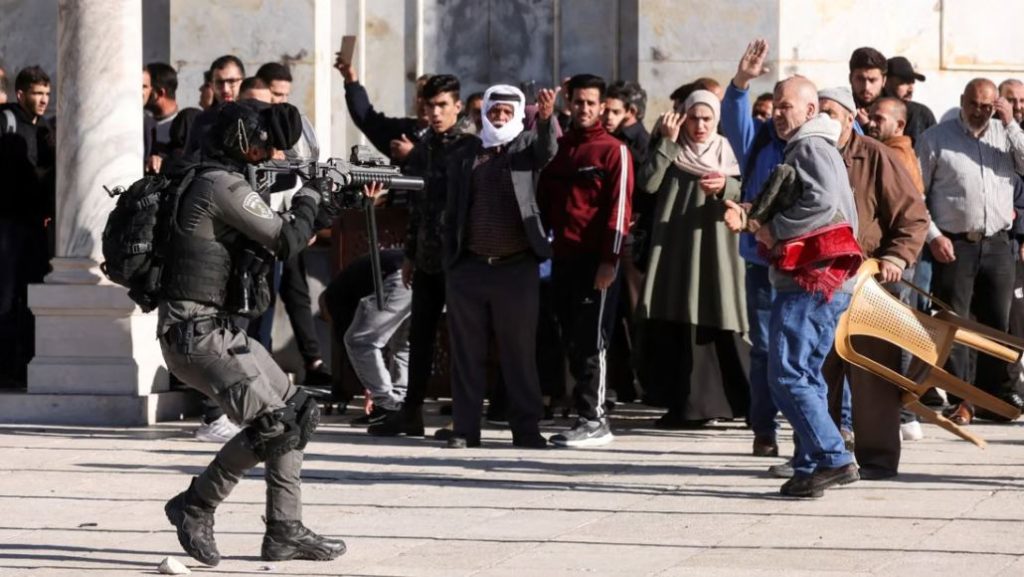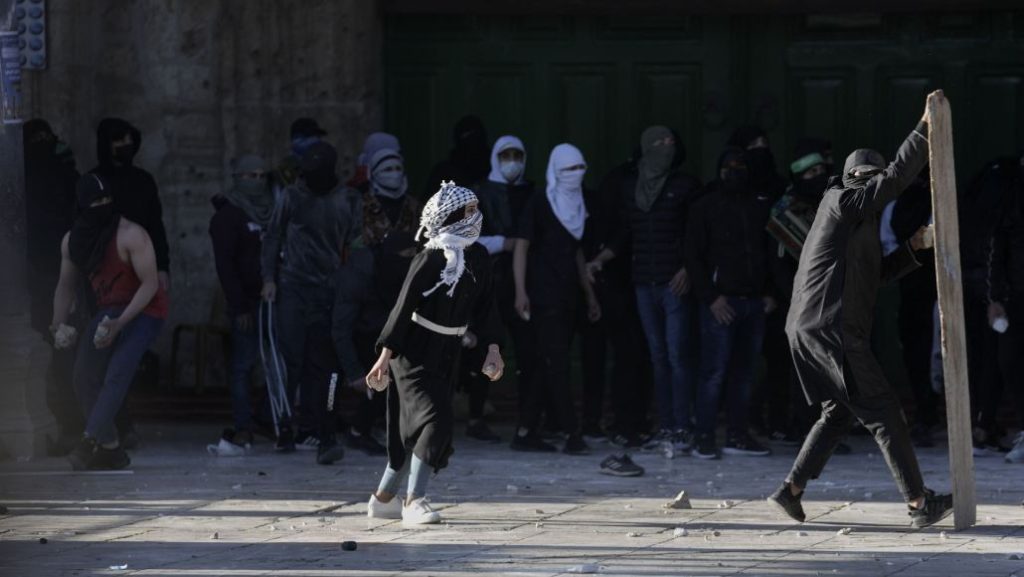
April 14 was the last Friday of the Muslim holiday of the month of Ramadan. Beyond its religious nature, this date is also Al-Quds Day, the Arabic name for the city of Jerusalem, capital of Palestine, whose eastern sector is one of the favorite targets of the Zionist offensive of the oppressive State of Israel.
By Pablo Vasco
Al Quds Day was established in August 1979 as a date of solidarity with the Palestinian people and against Zionism by the government of Ayatollah Khomeini, in the midst of the revolution against the Shah of Iran. Since then, many Arab and Western countries have held events in this sense.
It should be recalled that while the United Nations recognizes the East Jerusalem sector as the capital of Palestine, the State of Israel considers the entire city as its own capital. In July 1980, the Israeli Parliament passed the so-called Jerusalem Law, declaring it its “whole and united” capital.
This unilateral decision prompted UN Security Council Resolution 478 the following month, which condemned Israel’s decision as “a violation of international law” and “a serious obstacle to the achievement of a comprehensive, just and lasting peace.” There followed six other similar Council resolutions since Israel never backed down and in 2018 ratified its absolute rule over Jerusalem through another of its so-called basic laws, which in fact have constitutional status.
In the current Al-Quds there were demonstrations and actions in several cities in Iran, Syria, Lebanon, Yemen and other Arab countries; in Canada, the United States and some European countries, and of course in Gaza, the West Bank and other Palestinian refugee camps.

A different commemoration
The geopolitical framework of this Al Quds shows marked differences from previous years. Not only because of the global weakening of Israel’s main imperialist ally, the United States, but also because of the deep political crisis that has been shaking the Zionist regime itself for months.
Since the ultra-right coalition led by Prime Minister Benjamin Netanyahu took office in Israel at the end of last year, and in the midst of an economic crisis that continues, his violent anti-Palestinian offensive and his project to subordinate the Supreme Court to the Israeli government have generated both an unprecedented resistance in Israeli sectors and a strengthening of the Palestinian Intifada.
Netanyahu’s judicial reform project, agreed between his Zionist Likud party and his partners of the ultra-right religious parties, which aims to cut back certain margins of independence of the Court, provoked massive protests in Tel Aviv and other Israeli cities. To stop them, the government suspended its controversial reform for the time being.
However, in exchange to its ultra-Zionist partners, it initiated the creation of a new armed “national guard”, with civilian participation of the racist anti-Palestinian settlers under the command of the Minister of National Security: the fascist Itamar Ben Gvir. “This minister heads the most right-wing party of the current government and in the past has been indicted more than 50 times and convicted eight times for rioting, vandalism, incitement to racism and support for a terrorist organization.”[1] This new militia is so provocative that it has become a “national security militia”.
This new openly anti-Palestinian militia, whose initial budget would come from cutting funds for health, education and other public services, has even sparked criticism from the state attorney general, the chief of police and the Israeli secret intelligence services…
At the same time, the violent attacks by the Zionist police and military forces against the Palestinian population -which have already caused almost one hundred assassinations so far this year- are strengthening the most radical sectors of the Palestinian people in the face of the passivity of the Palestinian Authority, a collaborator with Israel. The Zionist offensive included a police raid on the sacred mosque of Al Aqsa, which caused harsh public criticism not only from Muslim, but also Christian and Orthodox Jewish leaders.
With Palestinian youth at the forefront, the political force of Hamas, Islamic Jihad and the secular Popular Front for the Liberation of Palestine (PFLP) is gaining strength. Likewise, “new militant groups have emerged, such as the Lion’s Den, the Balata Battalion or the Black Cave. The Palestinian youth does not currently have a hegemonic political leadership, it completely disbelieves in ‘the two States’ approach and its legitimate yearning is liberation from the Israeli occupation”[2].

No to the trap: Semitism = Judaism = Zionism
All over the world, through the International Holocaust Remembrance Alliance (IHRA), Zionism is pushing a dangerous definition in order to criminalize any expression critical of the State of Israel and its anti-Palestinian policy. Their trap consists in equating three concepts of very different nature: Semitic (ethnic), Jewish (religious) and Zionist (political).
Based on this fallacy, their aim is to silence any political questioning of any Zionist action of the State of Israel or its institutions under the accusation of anti-Semitism and thus prosecute and even punish them before the criminal justice system. This is the case of Alejandro Bodart, leader of the Argentine MST and the International Socialist League (ISL).
In this sense, as pointed out by 60 religious and human rights organizations from various countries that two weeks ago formally asked the UN to reject the IHRA definition, “a person dedicated to defending the rights of Tibetans could be accused of anti-Chinese racism, or a group dedicated to promoting democracy and the rights of minorities in Saudi Arabia could be accused of Islamophobia”[3].
But no. Neither are all Semites Jews, since Semites are also all Arab peoples and therefore Palestinians, nor are all Jews Zionists. The attempt to equate anti-Zionism and anti-Semitism is a hypocrisy of Zionism, a counter-revolutionary political ideology that encourages Jewish supremacy and anti-Palestinian racism. The State of Israel, since its creation in 1948 by robbing the Palestinians of their ancestral lands by blood and fire, continues to commit genocide against this long-suffering people.
What is the way out?
As the resolution on Palestine and the State of Israel adopted at the 2nd ISL World Congress, held in March in Barcelona, states: “The only strategic way out to achieve a genuine and definitive peace in all this troubled region is to dissolve the genocidal and racist State of Israel, establishing in its place a secular and democratic Palestine in all the historical territory, from the Jordan River to the Mediterranean Sea and with Jerusalem as it capital, to which the more than five million Palestinian refugees can return, especially in Jordan, Syria and Lebanon, and live in peace with the Jewish population and other religions. This will only be possible if a socialist revolution advances in the whole region. We understand this future socialist Palestine as an integral part of a federation of socialist republics of the Middle East.
“The road to achieve that way out is the joint struggle of the heroic Palestinian resistance and the Arab peoples of the region, over their complicit governments of Israel, plus the support of the anti-Zionist democratic Jews who are among those mobilizing in Israel today against the Netanyahu government and the ultra-right, and in that process build a strong revolutionary party.”
[1] https://www.infobae.com/america/agencias/2023/04/02/nueva-guardia-nacional-a-cargo-de-un-ministro-extremista-preocupa-en-israel/
[2] https://lis-isl.org/2023/03/14/2-congreso-de-la-lis-resolucion-sobre-palestina/
[3] https://www.jns.org/60-groups-urge-un-to-avoid-ihra-antisemitism-definition/








